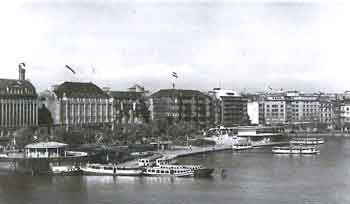run and the beds were notable because one slept on a sheet on a mattress, had a
pillow on an uncomfortable firmly-padded wedge at the top of the bed and, for
cover, two half-length, feather-filled, thick eiderdowns. Being tall I had the most
damnably uncomfortable nights. At my every move the eiderdowns kept moving
about and leaving a chilly strip somewhere across my middle.



Looking across the Binnen Alster in 1953. The Streits Hotel is one of the buildings on the right.

The centre of Hamburg had suffered horrendous fire storms in the war but little evidence of that was to be seen. Most buildings had either been rebuilt or replaced and, within obvious constraints, the city was thriving. The trams were running, the S-Bahn and the UBahn were fully operational, and the population was reasonably affable towards us.
2

On one of our evenings
Johnny
Macknish and I took the S-Bahn to the St Pauli district to walk along the infamous Reeperbahn and see the sights. The others had a different agenda. It was sleazier than Soho in London. Just about every form of 'entertainment' was there, from brothels (in the Herbert Strasse), night clubs, strip joints, to pavement touts selling
(genuinely) filthy post cards. All these, and other outwardly more respectable
establishments lined the thoroughfare. We walked round in the crowds, took in the
sights, and after a couple of hours we had seen enough, so went back to our hotel.
On our return to Jever on the last Saturday in October, our
Squadron Archivist,
Flt.Lt. Brian Iles, recorded our tour as a 'social success'. I am prepared to let him have
the last word.
3

The following Friday, after the
Squadron trip to Sennelager Range, I was off with the hockey team again. We left Jever in the afternoon by train for Hanover
where, after a snack in the Salvation Army 'Red Shield' canteen on the platform, we
joined the overnight troop-train to travel through the Russian Zone to Berlin.

On the troop-train we were ordered to keep all blinds drawn and to show as few lights as possible. We had couchette accommodation and were able to undress
for the night. It seemed strange that we were in our pyjamas in potentially enemy
territory. My feeling of personal vulnerability was difficult to suppress. The train
stopped several times in the night but we arrived on time in the cold light of the
following morning. Transport took us to RAF Gatow where we were to stay for that
night (Saturday) before arriving back at Jever late on Monday.

Our match was against the Kings Own Yorkshire Light Infantry at a pitch close by the old Olympic Stadium. The result was a 1 - 1 draw.

On returning to Gatow we had a meal and then went into 'town' to see what
Berlin looked like. There was more obvious war damage than in Hamburg and, on
finding little to do, we went into a theatre bar for a relaxed Pils or two. We had to be
careful to avoid the East Zone border so did not stray far before returning to Gatow.

Next morning we booked a trip with the Salvation Army for an afternoon bus tour around West Berlin and into the Russian Zone.
4 But before lunch two of us
_____________________________________
2 S-Bahn = Stadtbahn or metro surface railway. The U-Bahn was the underground equivalent.
3
Brian Iles owned his own Miles M18 private aeroplane. It was understood to be the only one of its type. More
of that later.
4 The Salvation Army had somehow negotiated the facility to run a sightseeing bus for British servicemen in
uniform into the Russian Zone, but only on a Sunday afternoon. We were lucky.
66







